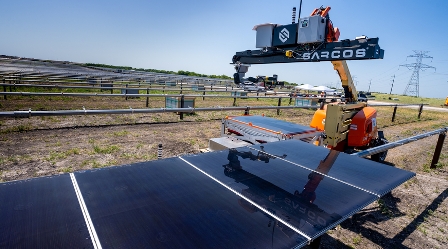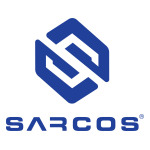
Sarcos and Blattner Company Sign Agreement for Development of Autonomous Robotic Solar Construction System
Industrial robotics leader and renewable energy leader team up to develop robotics aimed at improving worker safety and solving labor shortages
SALT LAKE CITY–(BUSINESS WIRE)–#robotics—Sarcos Technology and Robotics Corporation (“Sarcos”) (NASDAQ: STRC and STRCW), a leader in the design, development, and manufacture of advanced robotic systems, solutions, and software that redefine human possibilities, and Blattner Company (“Blattner”), an industry-leading provider and installer of renewable energy, announced that the companies have entered into a collaboration agreement. The agreement focuses on the development and refinement of Sarcos’ autonomous mobile robotic system designed to optimize employee safety and enhance the efficiency of the installation of photovoltaic (PV) modules for utility-scale solar projects.
“Like many industries, the solar construction industry is experiencing significant worker shortages post-COVID and has not yet recovered,” said Laura Peterson, Interim President and CEO, Sarcos. “Our autonomous robotic solar construction system is expected to ease these workforce challenges while improving overall safety and speed in the solar installation process.”
Robotic technology is becoming critical to the global effort to increase solar power output, given worker shortages and the labor-intensive solar installation process. According to the Solar Energy Industries Association (SEIA), annual solar installations will need to increase by 60% through 2030 in order to meet climate targets, which would require nearly 800,000 new solar workers to meet this goal. Robotics hold the promise of increasing worker productivity to mitigate labor pressures in this market while simultaneously improving safety on the job. Blattner is committed to finding safe and effective solutions to meet the outlined aggressive climate targets while providing a positive and healthy work environment for its growing project teams. This partnership aims to satisfy both parties’ objectives.
“We are extremely optimistic about the use of robots for solar construction to help address the workforce shortages, productivity, and safety challenges that are currently slowing down the progress of U.S. solar initiatives,” said Matt Hadsell, Senior Manager-Innovation and Development, Blattner. “We are committed to working with Sarcos to refine their autonomous robotic solar construction system so that we can be one step closer to achieving our nation’s clean energy goals.”
This effort will also build upon the Sarcos Outdoor Autonomous Manipulation of Photovoltaic Panels (O-AMPP) project, which is funded through the support of the U.S. Department of Energy’s Solar Energy Technologies Office (SETO) and aims to streamline the process of solar field construction. The robotic system is being designed and developed to deliver, detect, lift, and place PV modules in the field with the goals of:
- Improving worker safety and productivity: The O-AMPP system will enable a smaller installation team to install modules at a substantially higher rate while optimizing safety.
- Improving construction speed: The O-AMPP system will enable faster installation speeds of PV modules, often the most labor-intensive task when constructing a PV site.
- Improving installation quality: Robotic handling of modules will ensure that as modules are picked up and placed, they are consistently supported and positioned, resulting in less module breakage.
Sarcos and Blattner are collaborating to evaluate and further refine the technology, functionality, and safety of this system through a series of field trials that will occur over the next several years in which Blattner will provide funding, expertise, and facilities for testing. The companies intend to test the system through varying environmental conditions across different sites in preparation for Sarcos’ commercial launch of the system, currently estimated for late 2024.
The innovative efforts of Sarcos and Blattner will lay important groundwork for shaping the future of solar energy installation for the industry as a whole and provide valuable data for determining the potential of automation and workforce evolution within the industry.
For more information on Sarcos and its robotics solutions f
or the solar industry, please visit www.sarcos.com. For more information on Blattner and its renewable energy expertise, please visit www.blattnercompany.com.
About Sarcos Technology and Robotics Corporation
Sarcos Technology and Robotics Corporation (NASDAQ: STRC and STRCW) designs, develops, and manufactures a broad range of advanced mobile robotic systems, solutions, and software that redefine human possibilities and are designed to enable the safest most productive workforce in the world. Sarcos robotic systems operate in challenging, unstructured, industrial environments and include teleoperated robotic systems, a powered robotic exoskeleton, and software solutions that enable task autonomy. For more information, please visit www.sarcos.com and connect with us on LinkedIn at www.linkedin.com/company/sarcos.
About Blattner
Blattner Company is Leading America to a Clean Energy Future. With more than 115 years of construction experience, the company has played a vital role in building America’s critical infrastructure, ranging from railroads and highways to dams and mines. Since 1997, Blattner has focused on renewable energy solutions and is responsible for the construction of some of the most significant solar, wind, transmission and energy storage projects in the U.S. and Canada. Blattner has installed more than 25% of America’s total solar and wind energy capacity. Blattner Company is the parent company of Blattner Energy and D.H. Blattner & Sons, of which all are members of the Quanta Services family of companies. Company headquarters are in Avon, Minnesota.
Forward-Looking Statements
This press release contains forward-looking statements within the meaning of the Private Securities Litigation Reform Act of 1995, including future collaboration with Blattner, the expected benefits of robotics and the Sarcos solution for the solar panel installation market, and product development, testing and trial plans, schedules and results. Forward-looking statements are inherently subject to risks, uncertainties, and assumptions. Generally, statements that are not historical facts, including statements concerning possible or assumed future actions, business strategies, events, or results of operations, are forward-looking statements. These statements may be preceded by, followed by, or include the words “believes,” “estimates,” “expects,” “projects,” “forecasts,” “may,” “will,” “should,” “seeks,” “plans,” “scheduled,” “anticipates,” “intends” or “continue” or similar expressions. Such forward-looking statements involve risks and uncertainties that may cause actual events, results, or performance to differ materially from those indicated by such statements. These forward-looking statements are based on Sarcos’ management’s current expectations and beliefs, as well as a number of assumptions concerning future events. However, there can be no assurance that the events, results, or trends identified in these forward-looking statements will occur or be achieved. Forward-looking statements speak only as of the date they are made, and Sarcos is not under any obligation and expressly disclaims any obligation, to update, alter or otherwise revise any forward-looking statement, whether as a result of new information, future events, or otherwise, except as required by law.
Readers should carefully review the statements set forth in the reports which Sarcos has filed or will file from time to time with the Securities and Exchange Commission (the “SEC”), in particular the risks and uncertainties set forth in the sections of those reports entitled “Risk Factors” and “Cautionary Note Regarding Forward-Looking Statements,” for a description of risks facing Sarcos and that could cause actual events, results or performance to differ from those indicated in the forward-looking statements contained herein. The documents filed by Sarcos with the SEC may be obtained free of charge at the SEC’s website at www.sec.gov.
This material is based upon work supported by the U.S. Department of Energy’s Office of Energy Efficiency and Renewable Energy (EERE) under the Solar Energy Technologies Office Award Number DE-EE0009327.
This press release was prepared as an account of work sponsored by an agency of the United States Government. Neither the United States Government nor any agency thereof, nor any of their employees, makes any warranty, express or implied, or assumes any legal liability or responsibility for the accuracy, completeness, or usefulness of any information, apparatus, product, or process disclosed or represents that its use would not infringe privately owned rights. Reference herein to any specific commercial product, process, or service by trade name, trademark, manufacturer, or otherwise does not necessarily constitute or imply its endorsement, recommendation, or favoring by the United States Government or any agency thereof. The views and opinions of authors expressed herein do not necessarily state or reflect those of the United States Government or any agency thereof.
Contacts
Sarcos PR and Investor Contacts:
mediarelations@sarcos.com
ir@sarcos.com


